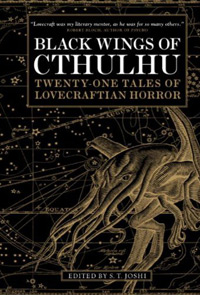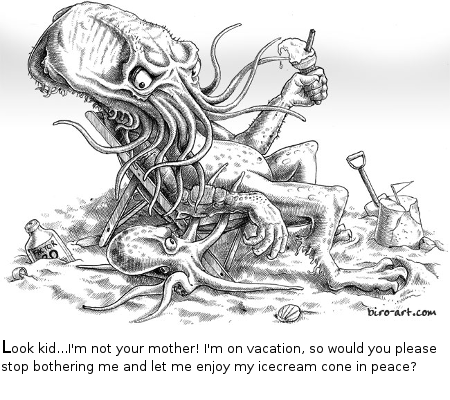Black Wings of Cthulhu - 21 Tales of Lovecraftian Horror edited by S.T. Joshi.

Once again a compendium of modern writing inspired by the characters and themes of H.P. Lovecraft. (I'm on a Mythos binge lately in case nobody's noticed.)
And once again a mixed bag of offerings. Of the twenty-one tales Caitlin Kiernan's
Pickman's Other Model (1929) is easily the best of the lot, closely followed by
Howling in the Dark by Darrell Schweitzer; and
Tempting Providence by Jonathan Thomas.
Less successful (purely as Mythos-inspired tales) but still enjoyable are Ramsey Campbell's
The Correspondence of Cameron Thaddeus Nash; and
Passing Spirits by Sam Gafford.
Norman Partridge's
Lesser Demons, a PA/Mythos mashup, didn't work for me at all. If you pulled out the one tiny allusion to the Mythos found in
Lesser Demons, it would read just like any other '
PA narrated from a lone survivor perspective' yarn.
Another flop (IMO) was scifi master Brian Stableford's
The Truth About Pickman. Not because it wasn't well written. (It was.) Not because it didn't have a good premise and a solid plot. (It did.) But despite all that, it still missed the boat because Mssr. Stableford makes the mistake far too many writers do when tackling a Lovecraft-type story: They explain
far too much!
The real joy of Lovecraft is how he leaves you with a sense of awe and mystery. And always wanting just a little more. Unexplained bumps in the night go largely unexplained. Mysterious texts are alluded to (sometimes even briefly quoted from) but never shown in full. And although Lovecraft may drop dots all over the landscape, he never
explicitly connects them. Or gives his reader every dot to work with.
It's a subtle art - giving the reader just enough to go on - but not enough to
completely work things out. And that sort of literary miracle working is Lovecraft's art and legacy. Modern horror writers could learn something here
if they could just stop hoping for a movie deal long enough to write a good horror novel rather than something that's merely ok
but can easily be adapted to film. Film is all about 'visual' whereas Lovecraft and the
classic horror genre (as opposed to
splatter-shock) is largely about things largely left unseen.
Good book overall. Worth a read if you're an H.P. fan. And the short story format is perfect for trips or when stuck at boring gatherings.

